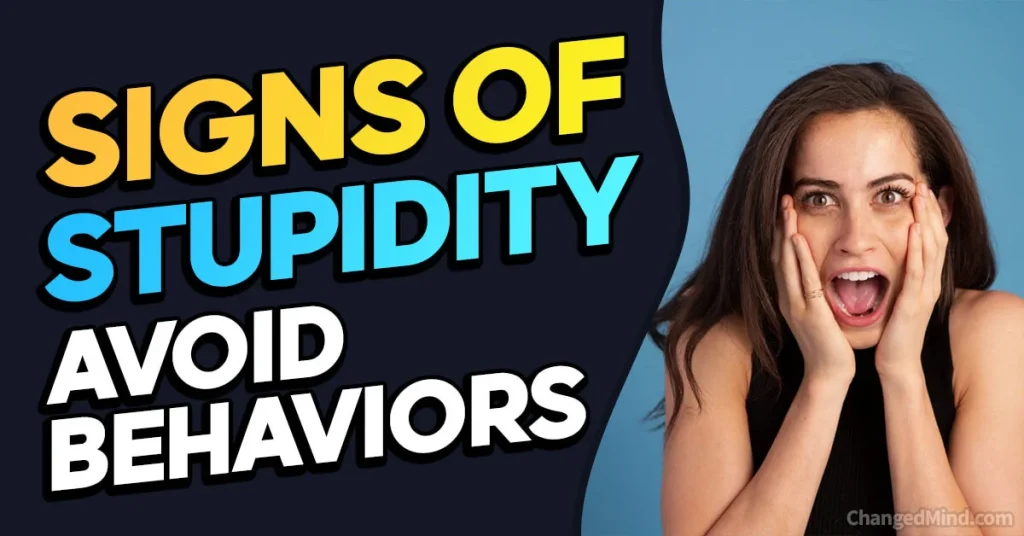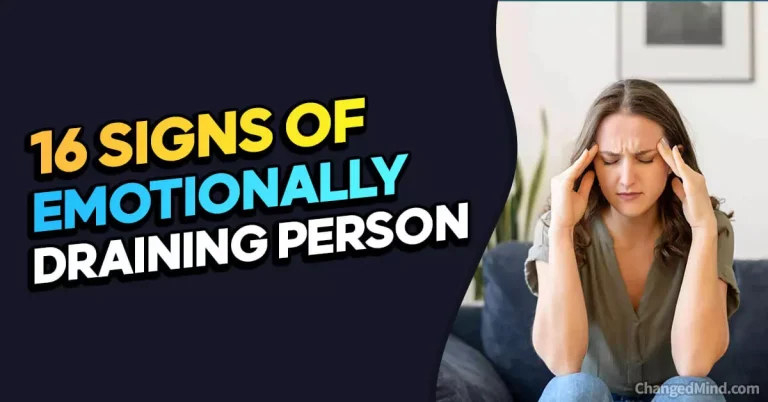Welcome to a fascinating exploration of the human condition—specifically, the signs of stupidity that can lurk in our daily interactions.
While the word “stupidity” might sound harsh, it is crucial to recognize and understand the behaviors associated with it. By doing so, you can save yourself from unnecessary frustration, wasted time, and even heartbreak.
So, let’s dive into this enlightening journey and uncover the impact of stupidity on relationships, body language, psychology, and your dating experiences.
Importance of Recognizing Signs of Stupidity
Recognizing signs of stupidity is not about belittling others or feeling superior. Instead, it’s about self-preservation and making informed decisions in various aspects of your life. By understanding these signs, you can become more discerning, protect your emotional well-being, and navigate through challenging situations with greater clarity.
How Stupidity Can Affect Relationships, Body Language, Psychology, and Dating Experiences
Stupidity can seep into different facets of our lives, leaving a trail of confusion and hindering personal growth. In relationships, it can lead to toxic dynamics, manipulative behaviors, and unfulfilling connections. In body language, it can mask intentions and hinder effective communication. In psychology, it can cloud judgment and impede growth. And in the realm of dating, it can sabotage potential connections and hinder your overall experiences.
Purpose of the Article
The purpose of this article is to empower you with knowledge, insights, and practical advice to identify the signs of stupidity. By familiarizing yourself with these signs, you can cultivate self-awareness, protect your well-being, and enhance your dating experiences. So, let’s embark on this illuminating journey together and equip ourselves with the tools to navigate the complexities of human behavior.
Now, let’s explore the ten key signs of stupidity and how they manifest in various aspects of our lives.
10 Signs of Stupidity: How to Identify and Avoid Common Foolish Behaviors
| Signs of Stupidity | Description |
|---|---|
| Lack of critical thinking | Inability to analyze situations objectively and make informed decisions. |
| Inability to learn from mistakes | Repeat the same errors without reflecting on past experiences and adjusting behavior. |
| Resistance to change | Stubbornness and unwillingness to embrace new ideas or adapt to different circumstances. |
| Poor listening skills | Inattentiveness, interrupting others, and failure to understand and empathize with their perspectives. |
| Lack of empathy | Inability to understand and share the feelings of others, resulting in self-centered behavior. |
| Overconfidence and arrogance | Excessive belief in one’s abilities, dismissing others’ opinions, and refusing to consider alternative viewpoints. |
| Ignorance of body language cues | Inability to interpret nonverbal signals, leading to miscommunication and misunderstandings. |
| Poor judgment and decision-making | Consistently making flawed choices and lacking sound reasoning in decision-making processes. |
| Inability to control emotions | Difficulty managing and regulating emotions, often resulting in impulsive and irrational behavior. |
| Resistance to personal growth and self-improvement | Avoidance of self-reflection, learning opportunities, and personal development. |

Sign 1: Lack of Critical Thinking Skills
Critical thinking is a vital skill that allows you to analyze information objectively, evaluate evidence, and make informed decisions. Unfortunately, a lack of critical thinking skills can be a clear sign of stupidity, as it hampers your ability to navigate life’s challenges effectively. Let’s explore this sign in more detail.
Explanation of Critical Thinking
Critical thinking involves actively questioning, examining, and challenging ideas and assumptions. It goes beyond accepting information at face value and encourages a deeper understanding of the world around us. When you possess critical thinking skills, you become more discerning and better equipped to separate fact from fiction.

Examples of Behaviors that Indicate a Lack of Critical Thinking
- Accepting information without questioning: Falling into the trap of believing everything you hear or read without critically assessing its validity.
- Relying solely on emotions: Making decisions based solely on your emotions, without considering logical reasoning or factual evidence.
- Engaging in black-and-white thinking: Adopting a rigid, all-or-nothing approach that fails to acknowledge nuances or alternative perspectives.
- Ignoring contradictory evidence: Disregarding evidence that challenges your preconceived notions or beliefs.
- Making hasty generalizations: Drawing sweeping conclusions without examining the underlying evidence or considering individual differences.
Impact on Decision-Making and Problem-Solving
A lack of critical thinking skills can have significant consequences in your decision-making and problem-solving abilities. When you fail to think critically, you may:
- Make impulsive decisions without weighing the potential consequences.
- Fall victim to cognitive biases that cloud your judgment and distort your perception of reality.
- Struggle to identify and evaluate alternative solutions, limiting your problem-solving capabilities.
- Miss out on opportunities for personal growth and self-improvement due to an unwillingness to challenge your existing beliefs.
Developing your critical thinking skills is essential for combating the signs of stupidity and fostering a more intelligent approach to life. By actively engaging in critical thinking, you empower yourself to make more informed decisions and navigate complex situations with greater clarity and confidence.
In the next section, we will explore another telltale sign of stupidity: the inability to learn from mistakes. Stay tuned!
Sign 2: Inability to Learn from Mistakes
We’ve all heard the age-old saying, “Learn from your mistakes,” but it’s surprising how many people fall into the trap of repeating the same errors over and over again. This inability to learn from mistakes is another significant sign of stupidity. Let’s delve into this topic and uncover why it’s essential to break free from this cycle.
Discuss the Importance of Learning from Past Experiences
Learning from mistakes is a fundamental aspect of personal growth and development. Each mistake presents an opportunity for self-reflection and improvement. When you embrace the lessons embedded within your past experiences, you gain valuable insights that help you make wiser choices in the future.
Signs that Someone Is Repeating the Same Mistakes
- Denial of responsibility: Failing to take ownership of their mistakes and shifting blame onto others or external circumstances.
- Lack of introspection: Avoiding self-reflection and failing to analyze the factors that contributed to the mistake.
- Repeating patterns: Engaging in the same actions or behaviors that led to previous mistakes, without making any adjustments.
- Disregard for feedback: Ignoring advice or feedback from others and dismissing constructive criticism.
- Unwillingness to adapt: Resisting change and clinging to familiar routines, even if they consistently result in negative outcomes.
Consequences of Failing to Learn from Mistakes
The repercussions of repeating the same mistakes can be far-reaching and detrimental to your personal growth:
- Stagnation: Without learning from mistakes, you remain trapped in a cycle of repeated errors, hindering your progress and growth.
- Damaged relationships: Repeating the same mistakes in relationships can lead to frustration, resentment, and a breakdown in trust.
- Missed opportunities: Failing to learn from mistakes can prevent you from seizing new opportunities and achieving your goals.
- Self-sabotage: Repeating mistakes unknowingly can sabotage your chances of success and hinder your overall well-being.
Breaking free from the cycle of repeated mistakes requires a commitment to self-awareness, reflection, and a willingness to learn and grow. Embrace the lessons that each mistake offers, and use them as stepping stones toward a more enlightened path.
Expert Says
Antoinette Bonafede, LMSW, DBT, REBT
Senior Associate Therapist, Gateway to Solutions

In the next section, we will explore another sign of stupidity: resistance to change. Stay tuned to discover how this resistance can hinder personal growth and development.
Sign 3: Resistance to Change
Change is an inevitable part of life, yet some people stubbornly resist it, clinging to familiar routines and refusing to adapt. This resistance to change is yet another telltale sign of stupidity. Let’s explore why embracing change is essential for personal growth and how you can overcome this resistance.
How Resistance to Change Can Hinder Personal Growth
Resisting change keeps you locked in a stagnant state, hindering personal growth and development. Growth often requires stepping out of your comfort zone, embracing new experiences, and adapting to the evolving world around you. By resisting change, you limit your opportunities for learning, self-improvement, and discovering new perspectives.
Indicators of Resistance to Change
Recognizing the signs of resistance to change can help you identify this aspect of stupidity in yourself or others. Common indicators include:
- Fear of the unknown: Feeling anxious or overwhelmed by unfamiliar territory, leading to a reluctance to explore new possibilities.
- Preference for routine: Sticking rigidly to familiar routines and resisting any alterations, even when they may be beneficial.
- Dismissal of new ideas: Instantly rejecting new concepts or perspectives without giving them a fair consideration.
- Longing for the past: Romanticizing the past and idealizing familiar situations, preventing forward movement.
- Defensiveness: Reacting defensively when presented with the need for change, making excuses or refusing to acknowledge the necessity for adaptation.
Strategies for Overcoming Resistance and Embracing Growth
- Recognize the benefits of change: Understand that change can lead to personal growth, new opportunities, and expanded horizons.
- Challenge your beliefs: Question your existing beliefs and assumptions, and be open to exploring new perspectives.
- Start small: Begin with small changes to gradually build your comfort level and increase your adaptability.
- Seek support: Surround yourself with individuals who embrace change and can provide guidance and encouragement.
- Embrace a growth mindset: Adopt a mindset that views challenges and change as opportunities for learning and development.
- Celebrate successes: Acknowledge and celebrate your achievements and progress as you navigate through changes.
Remember, change is an inherent part of life, and resisting it only hinders your growth and potential. By embracing change and adapting to new circumstances, you unlock a world of possibilities and set yourself on a path of continuous self-improvement.
In the next section, we will explore another significant sign of stupidity: poor listening skills. Stay tuned to discover how this can impact your communication and relationships.
Sign 4: Poor Listening Skills
Have you ever had a conversation with someone who seemed more interested in hearing their own voice than understanding what you were saying? Poor listening skills are a red flag that shouldn’t be ignored, as they indicate a lack of attentiveness and empathy. In this section, we’ll explore the importance of active listening, signs of poor listening skills, and practical ways to improve your listening abilities for better understanding and connection.
The Role of Active Listening in Effective Communication
Active listening is a cornerstone of effective communication. It involves fully engaging with the speaker, paying attention to both verbal and non-verbal cues, and genuinely seeking to understand their perspective. By practicing active listening, you create an environment of mutual respect and open communication, fostering deeper connections and meaningful conversations.
Signs of Poor Listening Skills
Identifying poor listening skills is essential to combat the signs of stupidity. Here are some common indicators:
- Interrupting or talking over others: Frequently cutting off others mid-sentence or dominating the conversation without allowing space for their input.
- Distracted behavior: Engaging in distractions like checking phones, looking around the room, or showing disinterest in the speaker’s words.
- Lack of eye contact: Avoiding eye contact or consistently looking away, signaling disengagement and disinterest.
- Inability to recall information: Frequently forgetting or misunderstanding important details shared by the speaker due to a lack of attentive listening.
- Offering unsolicited advice or judgments: Jumping in with immediate solutions or judgments instead of fully understanding the speaker’s perspective.
Ways to Improve Listening Skills for Better Understanding and Connection
- Be present: Practice mindfulness and be fully present in the conversation, giving your undivided attention to the speaker.
- Avoid distractions: Minimize distractions by turning off notifications on your devices and finding a quiet, conducive environment for conversations.
- Maintain eye contact: Show genuine interest and attentiveness by maintaining eye contact with the speaker.
- Practice empathy: Put yourself in the speaker’s shoes, striving to understand their perspective and feelings without jumping to judgment.
- Practice reflective listening: Summarize and paraphrase what the speaker said to ensure you’ve understood them correctly and show that you value their words.
- Ask open-ended questions: Encourage the speaker to share more by asking open-ended questions that invite thoughtful responses.
- Avoid interrupting: Allow the speaker to finish expressing their thoughts before responding, and resist the urge to interrupt.
- Practice patience: Give the speaker the time and space they need to express themselves fully, without rushing or becoming impatient.
Improving your listening skills takes practice, but the benefits are invaluable. By becoming a better listener, you build stronger relationships, gain deeper insights, and avoid misunderstandings that can result from poor communication.
In the next section, we will explore another significant sign of stupidity: a lack of empathy. Stay tuned to understand how empathy shapes our interactions and relationships.
Sign 5: Lack of Empathy
Empathy is the ability to understand and share the feelings of others, to put ourselves in their shoes and connect on a deeper emotional level. A lack of empathy is not only a sign of stupidity but also a hindrance to building healthy and meaningful relationships. In this section, we’ll explore the definition of empathy, its importance in relationships, behaviors that demonstrate a lack of empathy, and how to develop empathy through practice and understanding.
Definition of Empathy and Its Importance in Relationships
Empathy is the capacity to comprehend and share the emotions and experiences of others. It allows us to forge genuine connections, build trust, and foster understanding.
In relationships, empathy is vital because it promotes mutual respect, effective communication, and the ability to provide support during difficult times. Without empathy, relationships can become shallow, one-sided, and devoid of emotional connection.
Expert Says
Sara Sloan, LMFT-Associate, MA Counseling
Marriage and Family Therapist, Austin Concierge Therapy

Behaviors That Demonstrate a Lack of Empathy
Identifying behaviors that showcase a lack of empathy can help you recognize this sign of stupidity in yourself or others. Here are some common indicators:
- Dismissing or minimizing others’ feelings: Invalidating or downplaying someone’s emotions instead of acknowledging and validating them.
- Lack of active listening: Failing to listen attentively or disregarding others’ concerns without showing understanding or empathy.
- Inability to see beyond one’s own perspective: Being unable to consider another person’s point of view or failing to acknowledge their feelings and experiences.
- Lack of emotional support: Neglecting to offer comfort, understanding, or empathy during challenging situations.
- Engaging in judgment and criticism: Criticizing others without considering the underlying circumstances or being quick to pass judgment without attempting to understand their perspective.
Developing Empathy Through Practice and Understanding
Empathy is a skill that can be cultivated and enhanced with practice. Here are some ways to develop empathy:
- Active listening: Practice active listening by focusing on the speaker, suspending judgment, and seeking to understand their emotions and experiences.
- Put yourself in their shoes: Imagine yourself in the other person’s situation and try to grasp their emotions, challenges, and perspective.
- Practice self-awareness: Understand your own emotions, biases, and beliefs to prevent them from clouding your ability to empathize with others.
- Ask open-ended questions: Encourage others to share their feelings and experiences by asking thoughtful, open-ended questions that invite them to express themselves fully.
- Practice compassion: Show kindness, patience, and compassion towards others, even if you haven’t experienced their specific circumstances.
- Read fiction and watch films: Engage with stories and narratives that explore diverse perspectives and experiences, helping you broaden your understanding and empathy.
Developing empathy is an ongoing process that requires effort and a willingness to understand and connect with others. By fostering empathy, you can enhance your relationships, strengthen emotional bonds, and navigate social dynamics with greater understanding and compassion.
In the next section, we will explore another significant sign of stupidity: overconfidence and arrogance. Stay tuned to discover how these traits can hinder personal growth and relationships.
Sign 6: Overconfidence and Arrogance
Confidence is a desirable trait that allows individuals to believe in themselves and their abilities. However, there is a fine line between confidence and overconfidence, which can manifest as arrogance.
Overconfidence and arrogance are significant signs of stupidity, as they can hinder personal growth, damage relationships, and lead to poor decision-making. In this section, we’ll explore the differences between confidence and overconfidence, signs of overconfidence and arrogance, and how to balance self-assurance with humility.
Differences Between Confidence and Overconfidence
Confidence is a healthy belief in one’s skills, knowledge, and abilities, coupled with self-assuredness. It is grounded in a realistic assessment of one’s strengths and limitations. On the other hand, overconfidence crosses the line into arrogance by an exaggerated sense of self-importance, an inflated view of one’s capabilities, and a disregard for others’ perspectives or contributions.
Signs of Overconfidence and Arrogance
Identifying signs of overconfidence and arrogance can help you recognize these traits within yourself or others. Here are some common indicators:
- Excessive self-promotion: Constantly boasting about achievements and abilities, seeking validation and admiration from others.
- Dismissing alternative viewpoints: Ignoring or belittling ideas or perspectives that contradict one’s own, without considering their validity.
- Taking unnecessary risks: Engaging in reckless behavior or making impulsive decisions without carefully assessing potential consequences.
- Lack of receptiveness to feedback: Reacting defensively or rejecting constructive criticism, believing that one is always right.
- Inconsiderate behavior: Disregarding others’ feelings, needs, or boundaries, displaying a sense of entitlement.
Balancing Self-Assurance with Humility
It’s important to find a balance between self-assurance and humility to avoid the pitfalls of overconfidence and arrogance. Here are some ways to achieve this balance:
- Self-reflection and self-awareness: Continuously assess and evaluate your strengths, weaknesses, and areas for growth with honesty and objectivity.
- Acknowledge limitations: Recognize that everyone has limitations and areas where improvement is needed. Embrace a growth mindset that values learning and personal development.
- Practice active listening: Pay attention to others’ perspectives, opinions, and feedback, valuing their contributions and seeking to understand diverse viewpoints.
- Embrace lifelong learning: Foster a mindset of curiosity and continuous learning, remaining open to new ideas and knowledge from a variety of sources.
- Show humility in success: Celebrate achievements with gratitude and humility, recognizing the role of others and expressing appreciation for their support.
- Encourage collaboration: Foster a collaborative environment where everyone’s ideas and contributions are valued, promoting teamwork and shared success.
By balancing self-assurance with humility, you create an environment that encourages personal growth, fosters meaningful connections, and allows for better decision-making. Remember, confidence is valuable, but it should always be accompanied by self-awareness, empathy, and a willingness to learn from others.
In the next section, we will explore another significant sign of stupidity: poor judgment and decision-making. Stay tuned to understand how these traits can impact your life and relationships.
Sign 7: Ignorance of Body Language Cues
Have you ever found yourself in a situation where someone’s words didn’t match their actions? Nonverbal communication, conveyed through body language cues, plays a crucial role in our interactions. Ignoring or misunderstanding these cues is a clear sign of stupidity, as it hinders our ability to understand others and respond effectively. In this section, we’ll explore the significance of nonverbal communication, examples of body language cues that are often overlooked, and how to improve your ability to read and interpret body language.
Exploring the Significance of Nonverbal Communication
Nonverbal communication refers to the messages conveyed through body movements, facial expressions, gestures, and other physical cues. It complements and enhances verbal communication, providing additional layers of meaning and conveying emotions, attitudes, and intentions. Understanding nonverbal cues allows us to grasp the underlying messages beyond words, leading to more accurate interpretations and effective communication.
Examples of Body Language Cues That Are Often Overlooked
Many people are unaware of the subtle signals conveyed through body language. Here are some commonly overlooked cues:
- Facial expressions: Microexpressions and subtle changes in facial expressions can reveal genuine emotions that might contradict spoken words.
- Eye contact: The duration and intensity of eye contact can convey interest, attentiveness, or discomfort.
- Gestures: Hand movements, arm positioning, and gestures can accentuate or contradict verbal messages.
- Posture: Slumped shoulders may indicate disinterest or low confidence, while an open and upright posture conveys confidence and engagement.
- Proximity: The distance between individuals can reflect comfort levels, boundaries, or intimacy.
- Touch: The frequency and nature of physical contact, such as a handshake or a gentle touch on the arm, can express warmth or establish rapport.
How to Improve Your Ability to Read and Interpret Body Language
Enhancing your skill in reading and interpreting body language can greatly improve your understanding of others and enhance your communication skills. Here are some tips to help you develop this important skill:
- Observe attentively: Pay close attention to the nonverbal cues exhibited by others during conversations or interactions.
- Educate yourself: Learn about different body language cues and their potential meanings through books, articles, or online resources.
- Practice empathy: Put yourself in the other person’s shoes and imagine how they might be feeling based on their body language.
- Cultivate self-awareness: Be aware of your own body language and the signals you may be inadvertently conveying to others.
- Consider context: Take into account the situation, cultural norms, and individual differences when interpreting body language cues.
- Ask clarifying questions: If you’re unsure about someone’s nonverbal cues, politely ask for clarification to avoid misinterpretation.
- Seek feedback: Request feedback from trusted individuals who can provide insights into your own body language and how it may be perceived by others.
Improving your ability to read and interpret body language takes time and practice. By sharpening this skill, you can gain a deeper understanding of others, enhance your communication effectiveness, and navigate social interactions with greater confidence.
In the next section, we will explore another significant sign of stupidity: poor judgment and decision-making. Stay tuned to understand how these traits can impact your life and relationships.
Sign 8: Poor Judgment and Decision-Making
Have you ever made a decision that turned out to be a complete disaster? Poor judgment and decision-making are unmistakable signs of stupidity that can have significant repercussions in both your personal and professional life. In this section, we’ll explore the impact of poor judgment, indicators that highlight this sign of stupidity, and strategies to enhance your decision-making skills.
The Impact of Poor Judgment on Personal and Professional Life
Your ability to make sound judgments and decisions directly affects various aspects of your life. Poor judgment can lead to:
- Negative consequences: Making impulsive or ill-informed decisions often results in unfavorable outcomes, affecting your personal relationships, career, and overall well-being.
- Strained relationships: Poor judgment can strain relationships with friends, family, and colleagues, as people may perceive you as unreliable or irresponsible.
- Missed opportunities: Making choices without careful consideration may cause you to overlook potential opportunities for personal growth, career advancement, or meaningful experiences.
- Stagnation: Repeated poor judgment can hinder personal growth and keep you stuck in unproductive patterns, preventing you from achieving your goals.
Indicators of Poor Judgment
Recognizing the indicators of poor judgment can help you identify and address this sign of stupidity. Some common indicators include:
- Impulsivity: Acting on immediate desires or emotions without considering the long-term consequences.
- Inadequate information gathering: Making decisions without gathering sufficient information or considering alternative perspectives.
- Ignoring intuition or gut feelings: Disregarding your own inner guidance or intuition that may warn you of potential pitfalls.
- Repeating past mistakes: Failing to learn from previous errors and making similar poor choices repeatedly.
- Overlooking potential risks: Neglecting to assess potential risks or downplaying their significance in decision-making.
Strategies for Enhancing Decision-Making Skills
Improving your judgment and decision-making abilities is a valuable skill that can positively impact various aspects of your life. Here are some strategies to enhance your decision-making skills:
- Gather information: Take the time to gather relevant information and consider multiple perspectives before making a decision.
- Analyze the pros and cons: Evaluate the potential benefits and drawbacks of different options to make more informed choices.
- Consider long-term implications: Assess how your decisions may impact your future and the broader context of your goals and values.
- Seek advice and feedback: Consult with trusted individuals who can provide valuable insights and alternative viewpoints.
- Practice critical thinking: Develop your critical thinking skills to evaluate information objectively, recognize biases, and identify logical fallacies.
- Embrace self-reflection: Regularly reflect on your decision-making process and outcomes to identify areas for improvement.
- Learn from mistakes: Treat mistakes as learning opportunities and use them to refine your decision-making skills for the future.
Enhancing your judgment and decision-making skills is an ongoing process. By consciously practicing these strategies and reflecting on your choices, you can make more thoughtful decisions, mitigate the impact of poor judgment, and create a path towards personal growth and success.
In the next section, we will explore another significant sign of stupidity: the lack of emotional control. Stay tuned to understand how emotional control affects your well-being and relationships.
Sign 9: Inability to Control Emotions
Have you ever been in a situation where your emotions got the best of you, leading to regrettable actions or words? The inability to control emotions is a clear sign of stupidity that can have detrimental effects on your relationships, decision-making, and overall well-being. In this section, we’ll explore the importance of emotional intelligence, signs that indicate emotional instability, and techniques for managing and regulating your emotions effectively.
Understanding the Importance of Emotional Intelligence
Emotional intelligence refers to the ability to recognize, understand, and manage your own emotions, as well as the emotions of others. It plays a crucial role in your personal and professional life, influencing your relationships, communication, and overall success. Being emotionally intelligent allows you to:
- Build strong relationships: By understanding and empathizing with others’ emotions, you can foster deeper connections and cultivate healthier relationships.
- Make better decisions: Emotional intelligence helps you make more rational and balanced decisions, considering both logic and emotions.
- Manage conflicts effectively: By regulating your emotions and responding to conflicts in a calm and composed manner, you can navigate challenging situations more successfully.
- Promote personal well-being: Emotional intelligence enables you to manage stress, cope with challenges, and maintain a positive mindset, leading to improved overall well-being.
Signs of Emotional Instability and Lack of Control
Lack of emotional control manifests in various ways. Here are some signs that indicate emotional instability:
- Excessive anger: Difficulty managing anger and frequent outbursts that may harm relationships and escalate conflicts.
- Overwhelming anxiety: Feeling constantly overwhelmed by anxiety, leading to impaired decision-making and a diminished sense of well-being.
- Impulsive behavior: Acting impulsively without considering the consequences, often driven by intense emotions in the moment.
- Inability to cope with setbacks: Being easily derailed by setbacks or failures, finding it challenging to bounce back and adapt to adversity.
- Overreacting to criticism: Reacting defensively or aggressively to constructive criticism, instead of using it as an opportunity for growth.
Techniques for Managing and Regulating Emotions
Enhancing your emotional control and managing your emotions effectively is an ongoing practice. Here are some techniques to help you develop this important skill:
- Recognize your emotions: Pay attention to your emotions as they arise, and label them to gain awareness and understanding.
- Practice self-awareness: Regularly check in with yourself to identify your emotional state and its triggers.
- Pause and breathe: When experiencing intense emotions, take a moment to pause and take deep breaths to regain composure.
- Engage in self-care: Prioritize activities that promote your mental and emotional well-being, such as exercise, meditation, or hobbies.
- Develop empathy: Cultivate empathy by putting yourself in others’ shoes, seeking to understand their perspectives and emotions.
- Utilize positive self-talk: Challenge negative thoughts and replace them with positive and empowering self-talk.
- Seek support: Reach out to trusted friends, family, or professionals who can provide guidance and support during challenging times.
- Practice mindfulness: Engage in mindfulness techniques, such as meditation or journaling, to cultivate present-moment awareness and emotional balance.
By incorporating these techniques into your daily life, you can gradually enhance your emotional control, develop greater self-awareness, and foster healthier emotional responses.
In the final section, we will explore the last sign of stupidity: resistance to personal growth and self-improvement. Stay tuned to discover the importance of embracing personal growth for a fulfilling and successful life.
Sign 10: Resistance to Personal Growth and Self-Improvement
Congratulations on reaching the final sign of stupidity: resistance to personal growth and self-improvement. This sign is particularly important because it hinders your ability to learn, adapt, and thrive in various aspects of life. In this section, we’ll explore the benefits of continuous self-improvement, indicators that suggest resistance to personal growth, and how to cultivate a growth mindset for a fulfilling and successful life.
The Benefits of Continuous Self-Improvement
Personal growth and self-improvement are not just buzzwords; they hold immense value in our lives. Here are some compelling benefits of embracing a mindset of continuous self-improvement:
- Unleashing your potential: By engaging in self-improvement, you tap into your untapped potential and discover new strengths and talents.
- Adapting to change: Life is full of changes and challenges. Personal growth equips you with the skills and resilience to adapt and thrive in the face of adversity.
- Expanding your knowledge and skills: Continuous learning broadens your horizons, enhances your expertise, and opens doors to new opportunities.
- Boosting self-confidence: As you make progress and achieve personal goals, your self-confidence grows, enabling you to take on new challenges with a positive mindset.
- Enhancing relationships: Personal growth fosters self-awareness, empathy, and effective communication skills, leading to healthier and more fulfilling relationships.
- Improving well-being: Actively working on self-improvement improves your overall well-being, happiness, and satisfaction with life.
Indicators of Resistance to Personal Growth
It’s important to recognize the signs that suggest resistance to personal growth. These indicators may include:
- Stagnation: Feeling stuck or complacent, without a desire or motivation to pursue personal goals or explore new opportunities.
- Closed-mindedness: Holding rigid beliefs and dismissing alternative perspectives or new ideas without giving them a fair chance.
- Fear of failure: Allowing the fear of failure to hold you back from taking risks or stepping outside of your comfort zone.
- Avoidance of feedback: Being defensive or dismissive of constructive criticism, instead of viewing it as an opportunity for growth.
- Lack of curiosity: Showing disinterest in learning new things or acquiring new skills, leading to a narrow and limited worldview.
Embracing a Growth Mindset for a Fulfilling Life
Cultivating a growth mindset is crucial for personal development and overcoming resistance to personal growth. Here are some strategies to help you embrace a growth mindset:
- Embrace challenges: See challenges as opportunities for growth and learning rather than obstacles.
- View failures as learning experiences: Embrace failures as valuable lessons that provide insights and pave the way for future success.
- Seek continuous learning: Cultivate a love for learning and seek opportunities to expand your knowledge and acquire new skills.
- Embrace feedback: Welcome feedback from others and use it as a tool for improvement and self-reflection.
- Set realistic goals: Establish achievable goals that push you outside of your comfort zone and allow for personal growth.
- Surround yourself with growth-oriented individuals: Surround yourself with people who inspire and support your personal growth journey.
- Practice self-reflection: Regularly reflect on your actions, behaviors, and beliefs to identify areas for improvement.
- Celebrate progress: Acknowledge and celebrate the progress you make along your personal growth journey, no matter how small.
Remember, personal growth is a lifelong process, and it’s never too late to start. Embrace the challenges, seek opportunities for self-improvement, and enjoy the journey of becoming the best version of yourself.
Congratulations on completing the exploration of the ten signs of stupidity! By understanding and recognizing these signs, you can make conscious efforts to avoid them and foster personal growth, critical thinking, and a fulfilling life. Stay curious, keep learning, and continue on the path of self-improvement.
Conclusion
Congratulations on reaching the end of this enlightening journey through the ten signs of stupidity! Let’s recap what we’ve learned and reflect on the importance of identifying and addressing these signs to promote personal growth and enhance your dating experiences.
Recap of the 10 Signs of Stupidity
Throughout this article, we’ve explored ten common signs of stupidity that can hinder your personal and interpersonal development. Let’s quickly recap them:
- Lack of Critical Thinking Skills: Failing to engage in thoughtful analysis and reasoning.
- Inability to Learn from Mistakes: Repeating the same errors without drawing lessons from them.
- Resistance to Change: Avoiding new experiences and shying away from personal growth.
- Poor Listening Skills: Failing to actively listen and understand others.
- Lack of Empathy: Inability to understand and share the feelings of others.
- Overconfidence and Arrogance: Exhibiting excessive pride and dismissing alternative viewpoints.
- Ignorance of Body Language Cues: Missing important nonverbal signals in communication.
- Poor Judgment and Decision-Making: Making uninformed or irrational choices.
- Inability to Control Emotions: Letting emotions dictate actions without proper regulation.
- Resistance to Personal Growth and Self-Improvement: Rejecting opportunities for self-development.
Identify and Address these Signs
Recognizing these signs within yourself is the first step towards personal growth and a more fulfilling life. Be honest with yourself and observe your behaviors and attitudes. Are there areas where you see these signs manifesting? If so, don’t despair! Awareness is key, and now you have the power to make positive changes.
Promoting Personal Growth and Enhanced Dating Experiences
By addressing these signs of stupidity, you pave the way for personal growth and improved dating experiences. Here’s how:
- Boost Self-Awareness: Understanding your own strengths and weaknesses allows you to make conscious choices and improve areas that need attention.
- Develop Critical Thinking Skills: Engage in critical thinking exercises, question assumptions, and seek diverse perspectives to enhance your decision-making abilities.
- Practice Active Listening: Cultivate the habit of active listening by being fully present and empathetically understanding others’ perspectives.
- Foster Emotional Intelligence: Learn to recognize and manage your emotions effectively, allowing for healthier and more meaningful connections with others.
- Embrace Personal Growth: Develop a growth mindset, seek continuous self-improvement, and be open to new experiences and challenges.
- Cultivate Empathy: Work on understanding and relating to others’ emotions, building deeper connections and fostering empathy in your relationships.
- Seek Knowledge: Expand your knowledge in areas such as psychology, communication skills, and social dynamics to better understand human behavior.
- Prioritize Self-Reflection: Regularly reflect on your actions, learn from mistakes, and adjust your behavior accordingly.
- Surround Yourself with Supportive Relationships: Seek out relationships that encourage personal growth, where you can learn from and support one another’s journey.
- Stay Curious: Maintain a sense of curiosity and a thirst for knowledge, always seeking opportunities for growth and self-improvement.
Remember, personal growth is a continuous process, and addressing these signs of stupidity is not an overnight transformation. It takes time, effort, and a commitment to your own development. But with each step forward, you’ll find yourself becoming wiser, more self-aware, and better equipped to navigate the complexities of dating and relationships.
So, embrace the journey of personal growth, learn from your experiences, and strive to become the best version of yourself. With an open mind and a commitment to self-improvement, you’ll not only enhance your dating experiences but also lead a more fulfilling and purposeful life.
Thank you for joining us on this insightful exploration of the signs of stupidity. May your path be filled with wisdom, growth, and meaningful connections!
FAQ
What are some common signs of stupidity in relationships?
Common signs of stupidity in relationships include a lack of empathy, poor communication skills, an inability to learn from mistakes, and resistance to personal growth and change.
How can I improve my critical thinking skills and avoid signs of stupidity?
To improve your critical thinking skills, practice analyzing situations objectively, questioning assumptions, seeking different perspectives, and considering evidence before making decisions. Engage in activities that stimulate your cognitive abilities and challenge your thinking.
Is it possible to change and overcome signs of stupidity?
Absolutely! Recognizing and acknowledging the signs of stupidity is the first step. By cultivating self-awareness, embracing personal growth, and seeking opportunities to learn, you can overcome these signs and develop greater wisdom and intelligence.
Can emotional intelligence be learned to overcome signs of stupidity?
Yes, emotional intelligence can be learned and developed. By practicing self-reflection, empathy, active listening, and regulating your emotions, you can enhance your emotional intelligence and reduce the impact of signs of stupidity in your interactions.
How can I become more self-aware and identify signs of stupidity in myself?
Becoming more self-aware requires honest self-reflection. Pay attention to your thoughts, emotions, and behaviors. Seek feedback from trusted friends or mentors, and engage in practices such as journaling or meditation to deepen your understanding of yourself and identify signs of stupidity.
Disclaimer
This information is for educational purposes only and is not intended to be a substitute for clinical care. Please consult a health care provider for guidance specific to your case.






